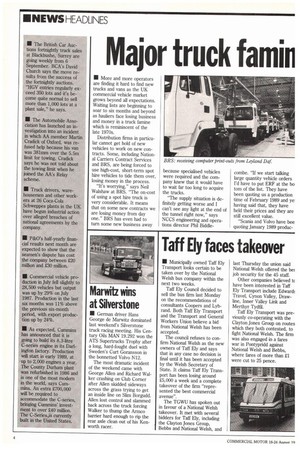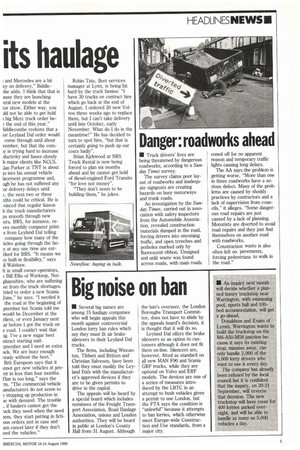Major truck famin its haulage
Page 4

Page 5

If you've noticed an error in this article please click here to report it so we can fix it.
• More and more operators are finding it hard to find new trucks and vans as the UK commercial vehicle market grows beyond all expectations. Waiting lists are beginning to soar to six months and beyond as hauliers face losing business and money in a truck famine which is reminiscent of the late 1970s.
Distribution firms in particular cannot get hold of new vehicles to work on new contracts. Some, including National Carriers Contract Services and BRS, are being forced to use high-cost, short-term spot hire vehicles to tide them over, losing money in the process.
"It's worrying," says Neil Walshaw at BRS. "The on-cost of using a spot hire truck is very considerable. It means that on some new contracts we are losing money from day one." BRS has even had to turn some new business away because specialised vehicles were required and the company knew that it would have to wait far too long to acquire the trucks.
"The supply situation is definitely getting worse and I can't see any light at the end of the tunnel right now," says NCCS engineering and operations director Phil Biddle combe. "If we start talking large quantity vehicle orders I'd have to put ERF at the ho torn of the list. They have been quoting us a production time of February 1989 and ye' having said that, they have held their prices and they are still excellent value.
"Scania and Volvo have bee quoting January 1989 produc and Mercedes are a bit ey on delivery," Biddle-the adds. I think that that is ause they are launching eral new models at the tor show. Either way, you ild not be able to get hold big Mere truck order be! the end of this year." liddlecombe reckons that a or Leyland Daf order would come through until about vember, but that the cornty is trying hard to increase ductivity and liases closely h major clients like NCCS. Ian Parker at TNT is about p into his annual vehicle lacement programme and, ugh he has not suffered any or delivery delays until v, the next two or three nths could be critical. He is Lvinced that regular liaison h the truck manufacturers ps smooth through new ers. BRS, for instance, rees monthly computer prints from Leyland Daf telling company how many of the ides going through the facy at any one time are earrked for BRS. "It means we ie built-in flexibility," says II Walshaw.
It is small owner-operators, Bill Ellis of Worksop, Notghamshire, who are suffering )st from the truck shortages. tried to order a new Scania June," he says. "I needed it the road at the beginning of ptember but Scania told me would be December at the rliest, or even January next ar before I got the truck on e road. I couldn't wait that g. I've a new sugar beet intract starting mid litember and I need an extra uck. We are busy enough ready without the beet." Brit European says that it innot get new vehicles at pre.tnt in less than four months. Chat is too long," says the 7m. "The commercial vehicle anufacturers do not seem to a stepping up production in le with demand. The trouble if hauliers cannot get the -uck they need when the need lem, they start putting in fictious orders just in case and len cancel later if they don't eed the vehicles." Robin Tate, fleet services manager at Lynx, is being hit hard by the truck famine: "1 have 30 trucks on contract hire which go back at the end of August. I ordered 30 new Volvos three weeks ago to replace them, but I can't take delivery until late October, early November. What do I do in the meantime?" He has decided to turn to spot hire, "but that is certainly going to push up our costs badly".
Brian Kirkwood at BRS Truck Rental is now being forced to plan six months ahead and he cannot get hold of diesel-engined Ford Transits "for love nor money".
"They don't seem to be building them," he jokes.










































